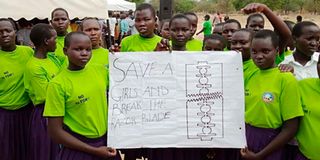Women perpetrate FGM, says Pokot elder

Students of Adurokoit Girls Secondary School in West Pokot County display a poster with an anti-FGM message at Tandapos area during a sensitization ceremony in August 2022.
What you need to know:
- More than 60 Pokot council of elders have recommitted to bring FGM and early marriages to an end.
- They have agreed to hold dialogue with men, women and youth at the community level.
- Pokot Council of Elders chairperson John Muok, confirmed that women are the perpetrators of FGM.
Repugnant cultural practices of Female Genital Mutilation (FGM) and early forced marriages in West Pokot County, could decline following a move by community elders to engage residents in dialogue.
More than 60 Pokot council of elders who met in Kapenguria recently, recommitted to bring FGM and early marriages to an end.
This follows a February 2021, declaration by the elders and government officials from Kenya and Uganda at Alale area along the Kenya –Uganda, to eradicate FGM in the region.
Elders are now leading the onslaught against the retrogressive practice and have embarked on a number of initiatives to end the vice.
Anti-FGM talks
Anti-FGM Board Chief Executive officer Bernadette Loloju who engaged the elders, men and women on anti-FGM talks, noted that the elders have great influence over community issues, which is useful in influencing the desired need of ending the practice.
“They have agreed to hold dialogue with men, women and youth at the community level. Elders are the custodians and gate keepers of culture that’s why we are collaborating with them,” she said.
She explained that although there is an anti-FGM law, the best approach to tackle the vice for now, is employing dialogue.
“FGM is brought about by early forced marriages where young boys want girls who are circumcised. We need to talk to the young men to stop this barbaric behaviour,” she said.
She noted that Morans even steal cattle to go and pay dowry.
“We shall partner with the county government and the office of the county commissioner and other stakeholders, to end the vices,” she said.
Cross-border FGM
She noted that many young girls drop out of school due to early pregnancies, adding that cases of cross-border FGM in the region are also on the rise.
“Our CS Prof Kobia signed a work plan with Kenya, Uganda, Tanzania, Ethiopia and Somalia to end FGM along borders,” she said.
The long school holidays between November and January make many girls go for the cut then are married off, Ms Loloju observed.
Pokot Council of Elders chairperson John Muok, confirmed that women are the perpetrators of FGM.
“Women incite and inflict fear in young girls if they are not cut they will not get married,” he added.
He said the community dialogues aim to educate residents on the physical, emotional and financial damage of FGM, early marriage and childrearing.
Early pregnancy
“Both FGM and marriage deny girls their rights and childhood, and deprive them of any chance of a bright future. It often means the end of a girl’s formal schooling and exposes her to health dangers associated with early pregnancy, physical and sexual violence, and an increased likelihood of poverty.” he said.
He pointed out that FGM cases have slightly declined since the elders came on board and started the campaign.
“We need a collective responsibility and funds to move around to sensitize the community against the vice,” said Mr Muok.
The former paramount chief said elders must end FGM through frequent campaigns in FGM prone areas.
“We shall make this region a zero FGM zone in few years,” he said.
FGM prevalence
An anti-FGM ambassador Selina Chepkeker offered to educate young women in FGM prone areas.
“Many girls have refused FGM and have become great leaders. We have also sensitized warriors,” she said, urging residents to take their children to school.
She called on President William Ruto to fund elders to help in sensitization to end the vices in the region.
FGM prevalence in the country is at 21 per cent. However, the prevalence is still high in the counties where communities practice FGM.
A recent research by Unicef shows that FGM prevalence in West Pokot is at 74 per cent.





